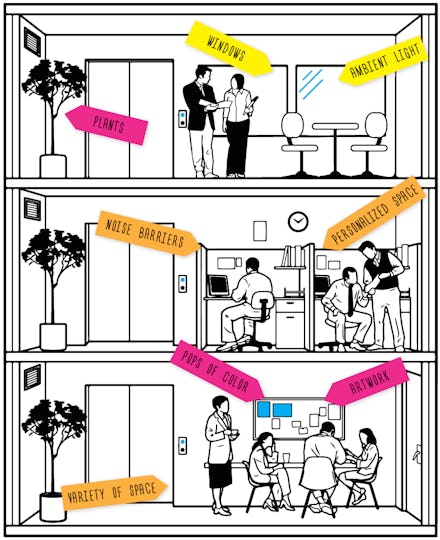These 6 Simple Things Will Make You Feel Awesome About Going to Work

The bad news: Our office jobs are killing us. In case anyone had any doubts that spending hours staring at a computer screen in a windowless room was a bad idea, a host of new research (from the finding that screen-time dries out our eyes to the discovery that open offices make us less creative) makes it pretty clear that simply having a 9-5 job can shave years off your life.
The good news: It doesn't have to be this way. Avoiding these awful office offenders can drastically improve your health. Here are six tips you need to start working smarter:
1. Sit by a window. Working in a windowless office, one recent study found, shaves 46 minutes off of your nightly sleep schedule. While it may not sound like a whole lot, close to an hour of lost sleep each weeknight quickly adds up: Missing four hours of shut eye each week translates into 48 hours of sleep loss every month, or nearly 600 hours (25 days) per year.
Stuck in a cubicle? Sit near a window at lunch. Better yet, get a taste of the real thing by eating outside.
2. Give your eyes a break. Staring at screens (yes, smartphones count too) leads to symptoms of dry-eye and can worsen vision.
If you work behind a computer, take periodic breaks with your eyes to focus on something in the distance. If you sit directly in the air flow of an air conditioning vent or a fan — move. Being constantly bombarded by puffs of stale air can make already dry eyes even more parched. And remember to blink enough when you're focused on work: Periodically closing our eyes is what keeps them lubricated.
3. Get up, stand up. You don't need to invest in a fancy standing desk. Just make sure you take periodic breaks from your seat. Too much sedentary time can have dozens of negative long-term consequences, from higher rates of chronic diseases, including heart disease and diabetes, to immediate effects such as strained and sore muscles.
Set a reminder to grab a cup of water, use the bathroom or stop by a co-worker's desk. Better yet, walk over to a window or take a quick stroll outside. Your brain, eyes and heart will thank you.
Image Credit: Giphy
4. Find a quiet spot to think. Noisy offices not only make it harder to work, they also make us more stressed out, even subconsciously. When Cornell University psychologists Gary Evans and Dana Johnson studied office workers who had been exposed to office commotion for three hours, they found heightened levels of the stress hormone adrenaline, which is associated with the fight-or-flight response, in their blood.
5. Cherish your privacy. While so-called "open offices," or work spaces without walls separating co-workers were all the rage a few years ago, recent studies suggest avoiding cubicle claustrophobia isn't worth it. Getting interrupted by your co-workers (surprise, surprise) makes it harder to get work done. And feeling a sense of privacy, it turns out, makes employees happier and more efficient. While open offices are often cited for their ability to foster a sense of community, organizational psychologist Matthew Davis found that they also drive down employees' creativity, attention and productivity, and make them feel more depressed at work.
If you have an office door, close it for a few minutes each day. If you work in a cubicle, learn to love those fuzzy brown walls; they're actually helping you work.
6. Bring the outside in. In her study on the impacts of office plants on worker health, Texas University horticulturist Tina Cade found that a few bits of green can make workers happier.
Image Credit: Giphy
Aside from their psychological benefits, trees and plants can also absorb harmful indoor pollutants, including especially damaging particulate matter — the tiny particles of liquid, metal, soil and dust (often the byproducts of building materials) that can pass through the throat into the lungs. In his pilot project, environmentalist Kamal Meattle found that three particular plants could mop up as much as 87% of indoor air pollutants within 24 hours.
Image Credit (All): Getty
Your 9-5 doesn't have to be a death wish: Desk jobs, originally championed for their ease and comfort (who wouldn't choose to spend their days in an air-conditioned office over a sweltering coal mine?), are shaping up to be vastly more harmful than their creators realized. Architects and designers, who began to take notice in the 90s and early 2000s, responded with a mass of "open" floor plans designed to make employees happier and healthier. (Fail.)
Rather than waiting for the next line of "healthy" offices to emerge, you can be confident that a few small, individual changes can go a long way in improving your quality of life in the office.